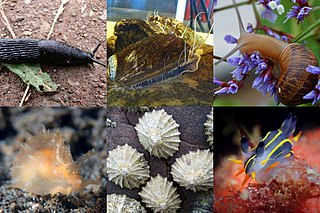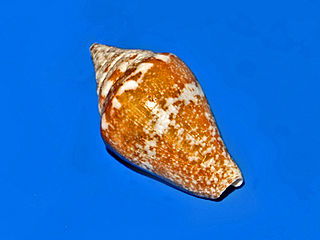
A seashell or sea shell, also known simply as a shell, is a hard, protective outer layer usually created by an animal or organism that lives in the sea. Most seashells are made by mollusks, such as snails, clams, and oysters to protect their soft insides. Empty seashells are often found washed up on beaches by beachcombers. The shells are empty because the animal has died and the soft parts have decomposed or been eaten by another animal.

Gastropods, commonly known as slugs and snails, belong to a large taxonomic class of invertebrates within the phylum Mollusca called Gastropoda.

Sea slug is a common name for some marine invertebrates with varying levels of resemblance to terrestrial slugs. Most creatures known as sea slugs are gastropods, i.e. they are sea snails that, over evolutionary time, have either entirely lost their shells or have seemingly lost their shells due to having a significantly reduced or internal shell. The name "sea slug" is often applied to nudibranchs and a paraphyletic set of other marine gastropods without apparent shells.
Volutoidea is a taxonomic superfamily of predatory sea snails, marine gastropod mollusks in the clade Neogastropoda.

A siphon is an anatomical structure which is part of the body of aquatic molluscs in three classes: Gastropoda, Bivalvia and Cephalopoda.

The periostracum is a thin, organic coating that is the outermost layer of the shell of many shelled animals, including molluscs and brachiopods. Among molluscs, it is primarily seen in snails and clams, i.e. in gastropods and bivalves, but it is also found in cephalopods such as Allonautilus scrobiculatus. The periostracum is an integral part of the shell, and it forms as the shell forms, along with the other shell layers. The periostracum is used to protect the organism from corrosion.

Sea snail is a common name for slow-moving marine gastropod molluscs, usually with visible external shells, such as whelk or abalone. They share the taxonomic class Gastropoda with slugs, which are distinguished from snails primarily by the absence of a visible shell.
A valve is each articulating part of the shell of a mollusc or another multi-shelled animal such as brachiopods and some crustaceans. Each part is known as a valve or in the case of chitons, a "plate". Members of two classes of molluscs, the Bivalvia (clams) and the Polyplacophora (chitons), have valves.

Mollusca is the second-largest phylum of invertebrate animals, after Arthropoda; members are known as molluscs or mollusks. Around 76,000 extant species of molluscs are recognized. The number of fossil species is estimated between 60,000 and 100,000 additional species. The proportion of undescribed species is very high. Many taxa remain poorly studied.

Alia carinata, common name the carinate dove shell, is a species of very small sea snail, a marine gastropod mollusc in the family Columbellidae, the dove snails.

Freshwater snails are gastropod mollusks that live in fresh water. There are many different families. They are found throughout the world in various habitats, ranging from ephemeral pools to the largest lakes, and from small seeps and springs to major rivers. The great majority of freshwater gastropods have a shell, with very few exceptions. Some groups of snails that live in freshwater respire using gills, whereas other groups need to reach the surface to breathe air. In addition, some are amphibious and have both gills and a lung. Most feed on algae, but many are detritivores and some are filter feeders.

Opeatostoma pseudodon, common name the thorn latirus or banded tooth latirus or red footed conch, is a species of predatory sea snail, a marine gastropod mollusk in the family Fasciolariidae, the tulip snails and spindle snails.
Astyris profundi is a species of sea snail, a marine gastropod mollusc in the family Columbellidae, the dove snails.

Indomitrella conspersa is a species of sea snail, a marine gastropod mollusc in the family Columbellidae, the dove snails.
Graphicomassa ligula is a species of sea snail, a marine gastropod mollusc in the family Columbellidae, the dove snails.

Costoanachis avara, the greedy dove shell, is a species of sea snail, a marine gastropod mollusc in the family Columbellidae, the dove snails.

Cotonopsis lafresnayi, common name the well-ribbed dovesnail, is a species of sea snail, a marine gastropod mollusk in the family Columbellidae, the dove snails.

Conella is a genus of sea snails, marine gastropod mollusks in the family Columbellidae, the dove snails.

Parametaria is a genus of sea snails, marine gastropod mollusks in the family Columbellidae, the dove snails.















